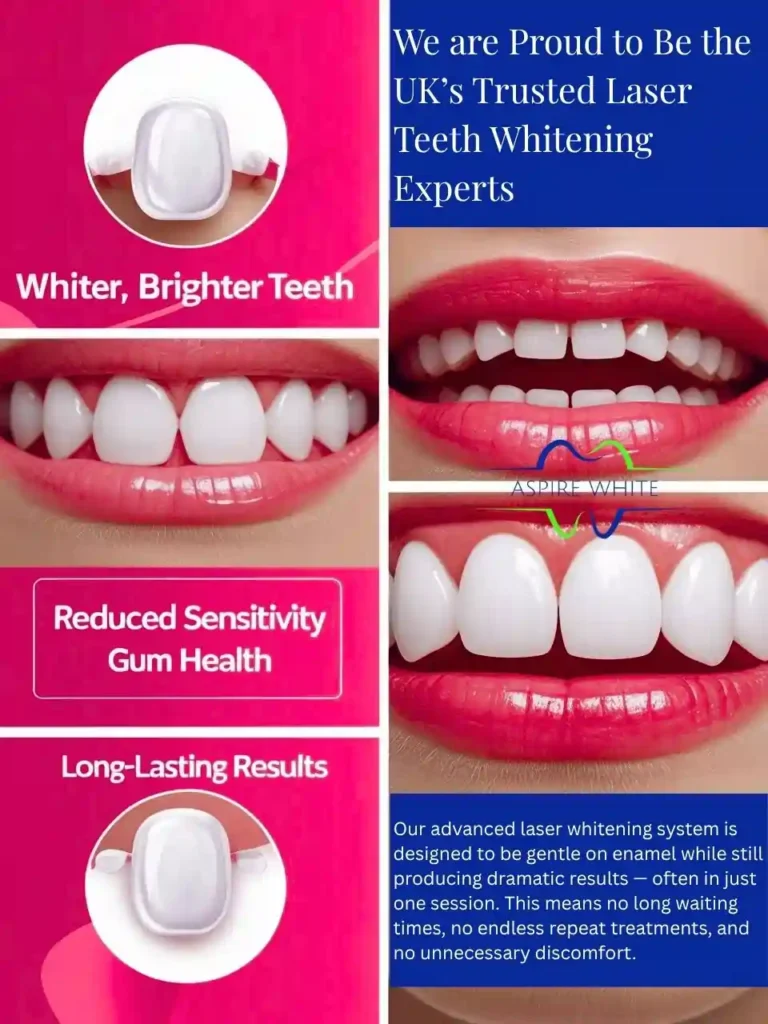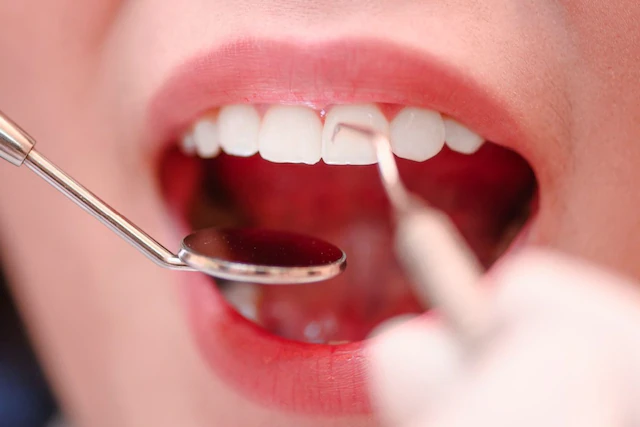We often think of oral health and mental health as two separate things — but in reality, they’re deeply connected. Your mouth is like a mirror for the rest of your body and mind.
Poor oral health can make you feel self-conscious, lower your confidence, and even trigger social anxiety. On the flip side, stress, depression, or low mood can cause you to neglect brushing and flossing, or even avoid dental check-ups.
At Aspire White Northampton, we believe in a more integrated approach. A healthy smile isn’t just about looking good — it’s about feeling good, too. See Here: Can Smokers Still Achieve a Bright Smile?
Our at-home laser teeth whitening treatments are designed to give you that confidence boost without the stress of a dental appointment, helping you take care of your smile in the comfort of your own space. When your oral and mental health are cared for together, you’re not just improving your teeth — you’re improving your whole sense of well-being.
When Stress Makes You Grind Your Teeth, How Does That Reflect What Your Mind Is Trying to Tell You Northampton?
Teeth grinding (or bruxism) often happens without you realising — maybe while you’re asleep or during moments of high tension.
It’s your body’s way of showing that your mind is under pressure. Long-term grinding can wear down your teeth, cause jaw pain, and even lead to headaches.
If you’ve been stressed lately, your mouth might be one of the first places it shows. At Aspire White Northampton, we encourage people to see these signs as little “wake-up calls” from the body.
Taking care of your smile — whether that’s through better daily hygiene or giving yourself a boost with our at-home whitening treatments — can be a way to pause, focus on yourself, and break the stress cycle. Your smile should be a reflection of your joy, not your tension.
How Could Brighter Oral Health Uplift Your Mood and Confidence in Daily Life?
There’s something powerful about looking in the mirror and loving the smile that looks back at you. A brighter smile can make you feel more confident when meeting new people, speaking in public, or even just taking a photo. It’s not vanity — it’s psychology. Studies show that when you’re confident about your teeth, you’re more likely to smile often, and smiling releases feel-good chemicals in the brain.
With Aspire White’s Northampton at-home laser teeth whitening, you can achieve that boost without disrupting your routine. You don’t need to book time off work or face the anxiety of a clinic setting. You can whiten your teeth at home, on your schedule, and let that brighter smile spill over into every part of your day.
How Exactly Does Depression or Anxiety Influence Your Dental Hygiene Routine Northampton?
When depression or anxiety takes hold, even small daily habits can feel overwhelming. Brushing twice a day might slip to once a day. Flossing might be forgotten entirely. And missed dental care can lead to staining, plaque build-up, and gum problems, which can then make you feel worse about your appearance — creating a vicious cycle. See Here The Discolouration Dilemma: Unveiling the Impact of Diet on Teeth Stains
Aspire White Northampton understands that sometimes the most challenging part is just starting again. That’s why we make our whitening treatments simple, comfortable, and designed for home use. Taking even one small step to care for your smile can be a powerful act of self-care, helping to break that cycle and give you a reason to smile again.

What Does Science Say About the Link Between Oral Bacteria and Mental Well-being Northampton?
Research has shown that harmful oral bacteria don’t just stay in your mouth — they can travel through your bloodstream and potentially affect your brain health.
Some research points to a possible link between the bacteria that cause gum disease and issues like cognitive decline or even Alzheimer’s. It’s a good reminder that looking after your mouth isn’t only about your teeth—it plays a big role in your overall health too.
At Aspire White Northampton, we encourage a proactive approach. While our at-home laser teeth whitening focuses on brightening your smile, it also motivates many of our clients to pay more attention to their overall oral hygiene. A cleaner, healthier mouth can mean a healthier mind.
How Do You Choose Between Quick Fixes and Long-term Integrated Oral Care?
The truth is, quick fixes can be tempting — but they often don’t address the root of the problem. Whitening toothpaste or a single dental cleaning might give temporary results, but lasting oral health comes from consistent care and healthy habits.
Aspire White Northampton offers a balance: our at-home whitening treatments give you visible results quickly, but they also fit into a longer-term self-care plan. When you see the difference in your smile, you’re more motivated to maintain it through daily brushing, flossing, and healthy lifestyle choices. It’s not just about one treatment — it’s about building a smile that lasts.
Could Improving Your Gums Also Improve Your Gut — and in Turn, Your Mood?
It might surprise you, but your gum health can affect your digestion. Bacteria from gum disease can travel to your gut, disrupting the balance of good and bad bacteria. Since gut health is closely linked to mood and mental clarity, taking care of your gums could improve how you feel day to day.
At Aspire White Northampton, we see whitening as part of a bigger picture. Many clients tell us that when they brighten their smile, they start brushing more carefully and paying attention to their gums. Check Out the Complete Guide to Teeth Whitening Methods
This not only helps prevent gum disease but can also support better gut health — and potentially a happier, calmer mind.
How Do Your Dental Habits Mirror Your Mental Health State Over the Past Year Northampton?
Think back over the last year. Were there times when you brushed less, skipped flossing, or avoided smiling in photos?
Those patterns often reflect what’s been going on in your mind. When we feel good, we tend to invest in ourselves. When we’re low, self-care can slide.
At Aspire White Northampton, we believe your dental habits can be a gentle guide to where your mental health is.
Starting with something small, like our at-home laser teeth whitening, can help you shift into a more positive, proactive mindset. It’s a physical change that can spark a mental one — a fresh smile for a fresh start.
For The Further Information, Please Call Us On 03300101078





